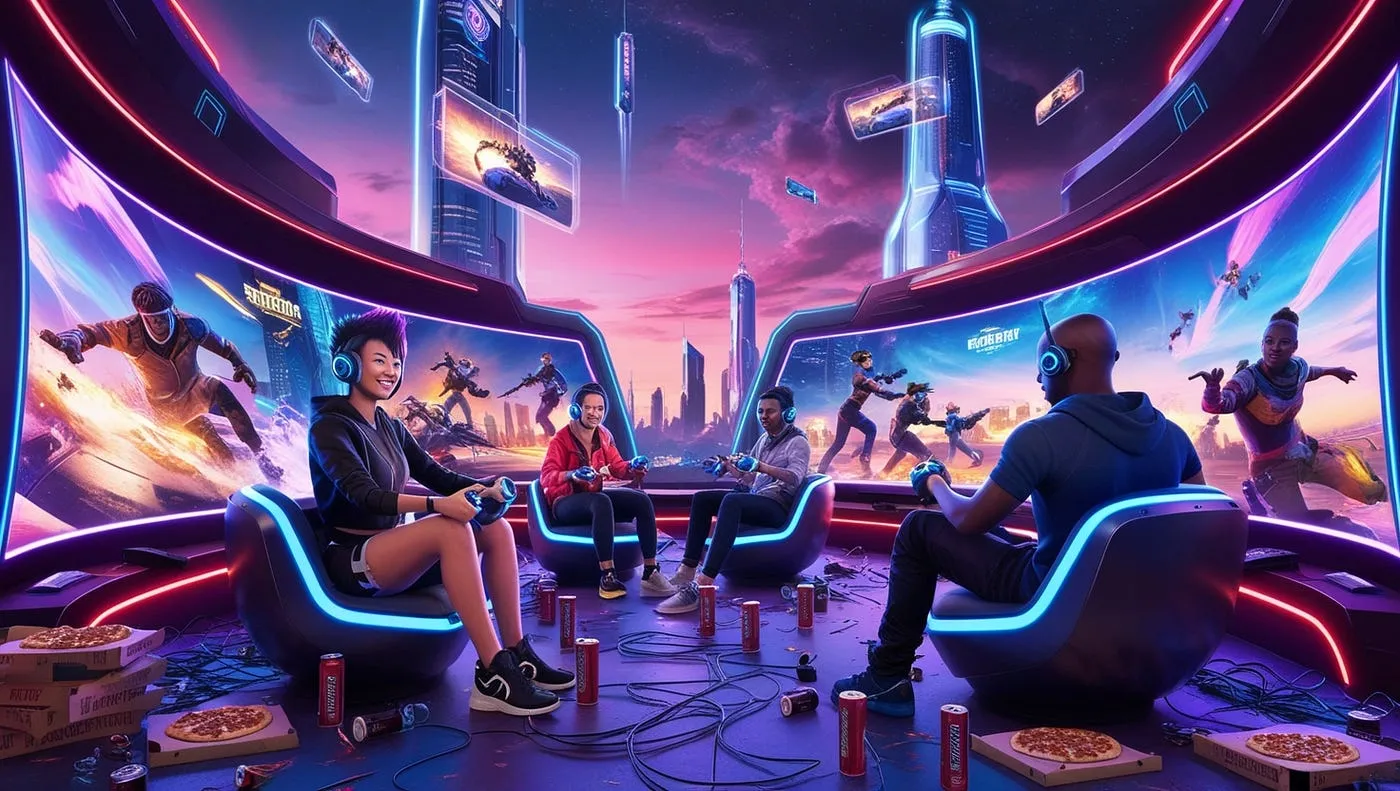Video games have become one of the most influential forms of entertainment in the 21st century. What started as simple pixelated graphics in the 1970s has evolved into an industry worth billions, blending art, storytelling, technology, and social interaction. Video games are no longer just “games”—they are a global phenomenon connecting players across cultures, platforms, and generations. Whether played on a console, PC, or smartphone, video games now shape how we play, learn, compete, and even communicate.
The Birth of Video Games: From Pong to PlayStation
The journey of video games began humbly. In the early 1970s, Pong, created by Atari, introduced the idea of interactive entertainment on screens. Soon after, arcade games like Space Invaders and Pac-Man became cultural icons, drawing crowds into neon-lit game centers. The 1980s saw the rise of home consoles, with Nintendo Entertainment System (NES) revolutionizing gaming with titles like Super Mario Bros. and The Legend of Zelda.
By the 1990s, video games had become a household staple. Sega and Nintendo engaged in a “console war,” while Sony entered the scene with the PlayStation, introducing advanced 3D graphics and immersive storytelling. The evolution of video games from 8-bit pixels to lifelike graphics marked a technological and creative leap that changed entertainment forever.
The Rise of PC and Online Gaming
While consoles dominated living rooms, PC gaming developed its own massive following. Titles like Doom, Half-Life, and Age of Empires set new standards for graphics, gameplay, and storytelling. As internet access expanded in the late 1990s and early 2000s, online gaming was born, allowing players to compete and cooperate with others worldwide.
Massively multiplayer online games (MMOs) such as World of Warcraft and Runescape introduced virtual worlds where millions of players could live alternate lives, complete quests, and build communities. This era transformed video games into social experiences, paving the way for modern-day esports and streaming platforms like Twitch.
The Mobile Gaming Revolution
The introduction of smartphones in the late 2000s brought gaming to everyone’s pocket. Titles like Angry Birds, Clash of Clans, and Candy Crush Saga made video games accessible to people of all ages. Mobile gaming removed barriers—no console, expensive PC, or TV was needed. A simple touch screen was enough.
Today, mobile games dominate global markets. Free-to-play models with in-app purchases have changed how developers make money and how players engage. Games like PUBG Mobile, Genshin Impact, and Mobile Legends have massive fanbases, rivaling traditional console titles in both player numbers and revenue. The mobile revolution ensured that video games reached billions of users worldwide, solidifying gaming as the most inclusive form of digital entertainment.
Video Games as Art and Storytelling
Modern video games are not just about shooting enemies or collecting points. They are art forms that combine visual design, music, storytelling, and player interaction. Titles like The Last of Us, Red Dead Redemption 2, and God of War demonstrate the emotional power of storytelling in video games. These experiences rival movies and novels in narrative depth, character development, and emotional impact.
Indie developers have also contributed to this artistic evolution. Games like Journey, Undertale, and Celeste show how small studios can create emotionally resonant and thought-provoking experiences. Through their interactive nature, video games allow players not only to witness a story but to live it, shaping outcomes through choices and actions.
Esports: The Competitive Side of Video Games
What was once considered a hobby has become a professional sport. Esports, or competitive gaming, now attracts millions of viewers worldwide and generates millions in prize money. Titles like League of Legends, Dota 2, Counter-Strike: Global Offensive, and Fortnite have become the backbone of the esports industry.
Tournaments fill massive stadiums, while top players are treated like athletes, complete with sponsorships, training camps, and fan bases. Esports also opened career paths beyond playing—such as shoutcasting (commentary), coaching, content creation, and event management. Platforms like Twitch and YouTube Gaming turned video games into spectator entertainment, merging gaming and broadcasting in ways no one imagined decades ago.
The Social and Educational Impact of Video Games
Video games often face criticism for promoting violence or addiction, but studies increasingly highlight their positive effects. Many games encourage strategic thinking, teamwork, problem-solving, and creativity. Multiplayer games improve social interaction, communication, and leadership skills as players collaborate to achieve goals.
Educational video games, such as Minecraft: Education Edition, are used in classrooms to teach math, history, and even coding. Simulation games like SimCity or Civilization help players understand real-world systems and critical decision-making. Moreover, video games can offer emotional relief, stress management, and even therapeutic benefits, especially for children and adults facing anxiety or loneliness.
In the age of digital connection, video games serve as bridges—linking people across continents and cultures through shared experiences.
The Business of Video Games: An Economic Powerhouse
The video game industry is now larger than the film and music industries combined. In 2024, global gaming revenue surpassed $200 billion, driven by console sales, in-game purchases, and online subscriptions. Major companies like Sony, Microsoft, and Nintendo continue to innovate with new hardware such as the PlayStation 5, Xbox Series X, and Nintendo Switch.
Meanwhile, PC gaming thrives with digital marketplaces like Steam and Epic Games Store, while mobile gaming dominates emerging markets. The business model of video games has diversified—subscription services (like Xbox Game Pass), cloud gaming (such as NVIDIA GeForce Now), and microtransactions have reshaped how games are sold and played.
The gaming industry’s growth also supports thousands of careers—from software engineers and designers to voice actors, composers, and marketers—making it one of the most dynamic sectors in global entertainment.
The Future of Video Games: Virtual Reality, AI, and Beyond
The future of video games is nothing short of revolutionary. Technologies like Virtual Reality (VR), Augmented Reality (AR), and Artificial Intelligence (AI) are redefining how players interact with games. VR headsets like Oculus Quest and PlayStation VR allow players to step inside the game world, offering fully immersive experiences. AR games like Pokémon GO blend digital adventures with real-world environments.
Artificial Intelligence plays an increasing role in creating smarter enemies, dynamic storylines, and adaptive worlds. AI-driven NPCs (non-playable characters) now respond intelligently to player actions, making each playthrough unique. Cloud gaming—offered by services like Xbox Cloud and Google Stadia—enables players to stream high-end games without needing expensive hardware.
In the coming decade, we may witness metaverse gaming, where social interaction, economy, and play merge into shared 3D worlds. Video games will continue pushing boundaries, blurring lines between virtual and real, entertainment and creativity, and technology and emotion.
Controversies and Challenges in the Gaming World
Despite its success, the gaming industry faces significant challenges. Issues like gaming addiction, loot boxes, cyberbullying, and gender discrimination have sparked global debates. Governments in some countries have implemented gaming regulations to protect young players from excessive screen time or gambling-like mechanics.
Another ongoing challenge is representation. While gaming communities are diverse, not all groups have been equally represented in game narratives or development teams. Encouraging inclusivity and ethical design practices remains vital for the future of gaming.
Moreover, as technology advances, so do cybersecurity threats. Online cheating, account hacking, and data privacy concerns demand stronger protections for players. The gaming industry must evolve responsibly, balancing profit with player well-being and digital ethics.
The Cultural Significance of Video Games
Beyond entertainment, video games have become a cultural language. They influence fashion, music, memes, and even politics. Events like The Game Awards celebrate not only gameplay but also artistic achievement. Video game soundtracks are performed by orchestras; game characters become movie icons; and gaming references appear in everyday life.
In many ways, video games reflect society’s hopes, fears, and dreams. They allow players to experience impossible worlds, test moral choices, and explore creativity without limits. As an art form, video games have achieved what once seemed impossible—uniting millions of people through shared emotion and imagination.
Conclusion: More Than Just Games
Video games are not simply a pastime—they are a global movement shaping the future of entertainment, technology, and culture. From the early days of Pong to the immersive VR worlds of today, gaming has continually evolved, inspiring creativity, competition, and connection.
As technology advances, video games will only become more immersive, intelligent, and inclusive. They represent not just digital fun, but a powerful reflection of human imagination and innovation.








